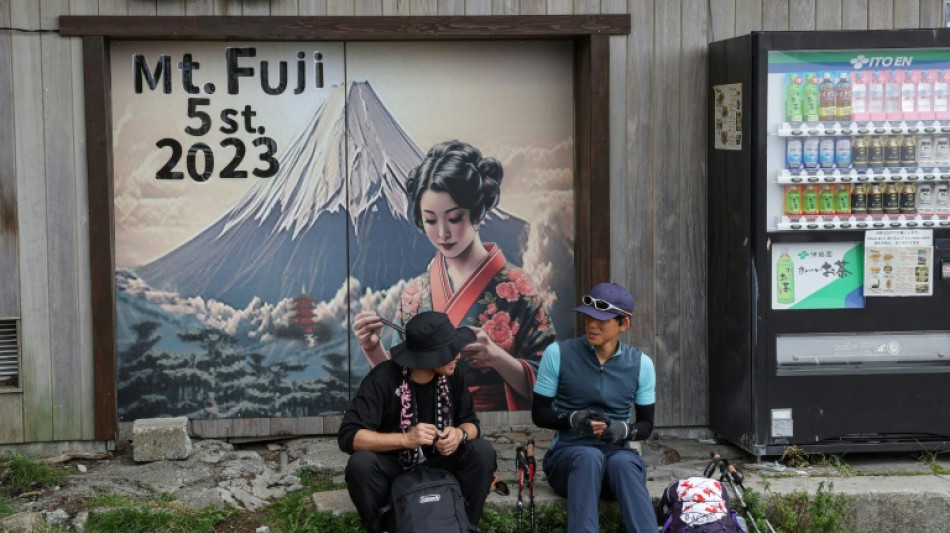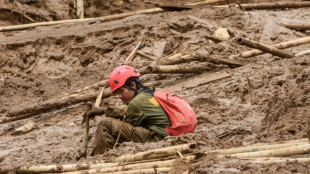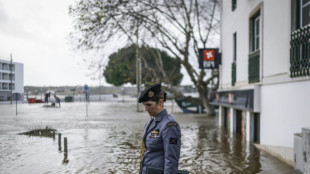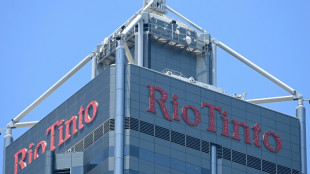
-
 Italy set for Winter Olympics opening ceremony as Vonn passes test
Italy set for Winter Olympics opening ceremony as Vonn passes test
-
England's Jacks says players back under-fire skipper Brook '100 percent'

-
 Carrick relishing Frank reunion as Man Utd host Spurs
Carrick relishing Frank reunion as Man Utd host Spurs
-
Farrell keeps the faith in Irish still being at rugby's top table

-
 Meloni, Vance hail 'shared values' amid pre-Olympic protests
Meloni, Vance hail 'shared values' amid pre-Olympic protests
-
Olympic freestyle champion Gremaud says passion for skiing carried her through dark times

-
 US urges new three-way nuclear deal with Russia and China
US urges new three-way nuclear deal with Russia and China
-
Indonesia landslide death toll rises to 74

-
 Hemetsberger a 'happy psychopath' after final downhill training
Hemetsberger a 'happy psychopath' after final downhill training
-
Suicide blast at Islamabad mosque kills at least 31, wounds over 130

-
 Elton John accuses UK tabloids publisher of 'abhorrent' privacy breaches
Elton John accuses UK tabloids publisher of 'abhorrent' privacy breaches
-
Lindsey Vonn completes first downhill training run at Winter Olympics

-
 Digital euro delay could leave Europe vulnerable, ECB warns
Digital euro delay could leave Europe vulnerable, ECB warns
-
Feyi-Waboso out of England's Six Nations opener against Wales

-
 Newcastle manager Howe pleads for Woltemade patience
Newcastle manager Howe pleads for Woltemade patience
-
German exports to US plunge as tariffs exact heavy cost

-
 Portugal heads for presidential vote, fretting over storms and far-right
Portugal heads for presidential vote, fretting over storms and far-right
-
Suicide blast at Islamabad mosque kills at least 30, wounds over 130: police

-
 Russia says Kyiv behind Moscow shooting of army general
Russia says Kyiv behind Moscow shooting of army general
-
Greenland villagers focus on 'normal life' amid stress of US threat

-
 Iran, US hold talks in Oman after Trump military threats
Iran, US hold talks in Oman after Trump military threats
-
Stocks waver as tech worries build

-
 Dupont, Jalibert click to give France extra spark in Six Nations bid
Dupont, Jalibert click to give France extra spark in Six Nations bid
-
'Excited' Scots out to prove they deserve T20 World Cup call-up

-
 EU tells TikTok to change 'addictive' design
EU tells TikTok to change 'addictive' design
-
India captain admits 'there will be nerves' at home T20 World Cup

-
 Stellantis takes massive hit for 'overestimation' of EV shift
Stellantis takes massive hit for 'overestimation' of EV shift
-
'Mona's Eyes': how an obscure French art historian swept the globe

-
 Iran, US hold talks in Oman
Iran, US hold talks in Oman
-
Iran, US hold talks in Oman after deadly protest crackdown

-
 In Finland's forests, soldiers re-learn how to lay anti-personnel mines
In Finland's forests, soldiers re-learn how to lay anti-personnel mines
-
Israeli president visits Australia after Bondi Beach attack

-
 In Dakar fishing village, surfing entices girls back to school
In Dakar fishing village, surfing entices girls back to school
-
Lakers rally to beat Sixers despite Doncic injury

-
 Russian pensioners turn to soup kitchen as war economy stutters
Russian pensioners turn to soup kitchen as war economy stutters
-
Japan taps Meta to help search for abuse of Olympic athletes

-
 As Estonia schools phase out Russian, many families struggle
As Estonia schools phase out Russian, many families struggle
-
Toyota names new CEO, hikes profit forecasts

-
 Next in Putin's sights? Estonia town stuck between two worlds
Next in Putin's sights? Estonia town stuck between two worlds
-
Family of US news anchor's missing mother renews plea to kidnappers

-
 Spin woes, injury and poor form dog Australia for T20 World Cup
Spin woes, injury and poor form dog Australia for T20 World Cup
-
Japan's Liberal Democratic Party: an election bulldozer

-
 Hazlewood out of T20 World Cup in fresh blow to Australia
Hazlewood out of T20 World Cup in fresh blow to Australia
-
Japan scouring social media 24 hours a day for abuse of Olympic athletes

-
 Bangladesh Islamist leader seeks power in post-uprising vote
Bangladesh Islamist leader seeks power in post-uprising vote
-
Rams' Stafford named NFL's Most Valuable Player

-
 Japan to restart world's biggest nuclear plant
Japan to restart world's biggest nuclear plant
-
Japan's Sanae Takaichi: Iron Lady 2.0 hopes for election boost

-
 Italy set for 2026 Winter Olympics opening ceremony
Italy set for 2026 Winter Olympics opening ceremony
-
Hong Kong to sentence media mogul Jimmy Lai on Monday


Japan's Mount Fuji 'screaming' from too many tourists
With its millions of visitors every year and the buses, supply trucks, noodle shops and fridge magnets, Japan's Mount Fuji is no longer the peaceful pilgrimage site it once was.
Now authorities have had enough, saying the number of hikers trekking up the world-famous volcano -- night and day -- is dangerous and an ecological embarrassment.
"Mount Fuji is screaming," the governor of the local region said last week.
Hailing its religious importance and its inspiration to artists, in 2013 UNESCO added the "internationally recognized icon of Japan" to its World Heritage List.
But as has happened in places such as Bruges in Belgium or Rio de Janeiro's Sugarloaf Mountain, the designation has been both a blessing and a curse.
Visitor numbers more than doubled between 2012 and 2019 to 5.1 million, and that's just for Yamanashi prefecture, the main starting point.
- Day and night -
It's not just during the day that a stream of people trudges through the black volcanic grit on their way up the 3,776-metre (12,388-foot) mountain.
At night, long lines of people -- on their way up to see the sun rise in the morning -- trek upwards with torches on their heads.
The main starting-off point is a car park that can only be reached by taxi or buses that take a couple of hours from Tokyo, around 100 kilometres (60 miles) away.
Greeting visitors is a complex of restaurants and shops selling souvenirs as well as snacks and drinks for walkers before they set off.
They are powered by diesel generators and the thousands of litres of water they use has to be brought up in lorries. Trucks also take all the rubbish down.
"I saw a lot of food waste and empty bottles of drinks lying around the hand-washing area of the toilet," complained Japanese hiker Yuzuki Uemura, 28.
- Dangers -
Masatake Izumi, a local official, said the high numbers of people increased the risk of accidents.
Some people who climb at night "get hypothermia and have to be taken back to first aid stations", he told AFP.
At least one person has died so far this season.
For an optional access fee of 1,000 yen ($6.80), visitors get a booklet in Japanese -- there is a QR code for the English version -- with some dos and don’ts.
But some don't realise how tough the five-to-six-hour climb is to the top, where oxygen levels are lower and where the weather can change quickly.
"It's almost winter up there, it's really cold," Rasyidah Hanan, a 30-year-old hiker from Malaysia, told AFP on her way down.
"People should be filtered a little bit because some people were not ready to climb Mount Fuji. They were like in really light clothes... Some of them really looked sick."
- Crowd control -
As tourist numbers get back to pre-pandemic levels, it's not only Mount Fuji whose returning crowds have authorities worried.
This week government ministers met to discuss measures to tackle what Kenji Hamamoto, a senior Japan Tourism Agency official, called "overcrowding and breaches of etiquette" across heavily touristed sites.
For Mount Fuji, authorities announced last month that they would impose crowd control measures for the first time if paths got too busy.
The announcement alone had an effect and in the end no such measures were taken, Izumi said.
Visitor numbers are expected to be down slightly this year from 2019, but in 2024 they could rise again as tourists -- particularly from China -- return.
Yamanashi's governor Kotaro Nagasaki said last week Japan needed to take measures to ensure Mount Fuji did not lose its UNESCO designation.
One solution, he said, could be constructing a light rail system to replace the main road leading to the main starting point for hikers.
"We firmly believe that with regard to Mount Fuji tourism, a shift from a quantity approach to a quality one is essential," Nagasaki said.
"I think that Mount Fuji is one of the things that makes Japan proud," said Marina Someya, 28, a Japanese hiker.
"There are a lot of people, and lots of foreigners."
D.AbuRida--SF-PST




